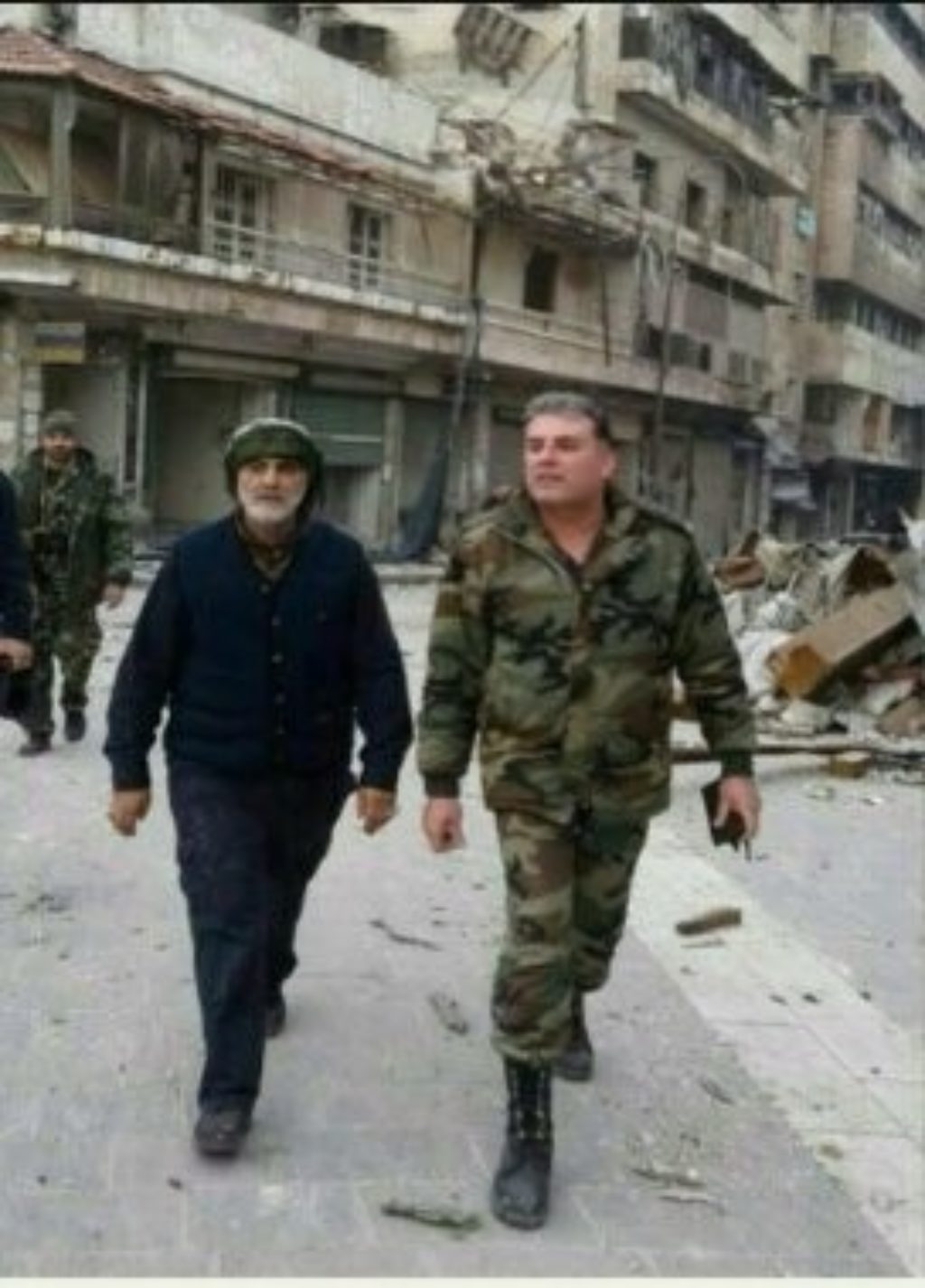Photographs emerged on Friday of Qassem Soleimani, a top Iranian commander who is under a United Nations travel ban, touring conquered eastern Aleppo, Amir Toumaj reported in the Long War Journal. It is unclear when the photographs, which were posted on social media, were originally taken.
A research analyst at the Foundation for the Defense of Democracies, Toumaj described the role Soleimani, head of Iran’s elite Quds Force, plays in preserving the rule of Syrian President Bashar al-Assad.
“Reporting directly to Supreme Leader Ali Khamenei, Soleimani has executed Iranian strategy in Syria since the popular uprisings in 2011. He was the point man who personally negotiated with President Vladimir Putin Russia’s military intervention in September 2015, according to unnamed security officials who spoke with Reuters,” Toumaj wrote.
“After more than five years, Soleimani has succeeded in preventing the fall of Bashar al Assad, protecting Iran’s supply route to Lebanese Hezbollah, and laying siege to Aleppo, Syria’s largest urban area prior to the war. He has mobilized thousands of Iranians, Syrians, Lebanese, Iraqis, Afghans, and Pakistanis to fight in Syria, forming an international Shiite expeditionary force.”
Jonathan Spyer, director of the Rubin Center, described “the entry of Russian airpower into the war” as the reason why “there is no longer any prospect of the Assad regime being removed by force.” Soleimani traveled to Moscow last July to negotiate Russia’s entry into the war, despite a UN travel ban.
The Syrian army and allied forces advanced on eastern Aleppo earlier this month, beating back opposition fighters until they agreed to evacuate the heavily-bombarded city. Hezbollah and Iran-backed Shiite militias have been accused of killing evacuees, in violation of the agreement.
In his capacity as the head of the Quds Force, which is responsible for the Islamic Revolutionary Guard Corps’ external operations, Soleimani oversees the funding, training, and equipping of Hezbollah, Palestinian Islamic Jihad, Assad’s forces, and Shiite militias in Syria, as well as the Houthi rebels in Yemen. The Quds Force also supported several Shiite militas that killed hundreds of American troops in Iraq.
In 2011, Soleimani and other members of the Qods Force were implicated in the failed Iranian plot to assassinate the Saudi Arabian ambassador to the U.S. at a popular restaurant in Washington, D.C. As part of the nuclear deal reached with Iran, the UN travel ban on Soleimani will be lifted either in October 2020 or when the International Atomic Energy Agency determines that all nuclear material in Iran is for peaceful purposes.
In The Iranian Empire is Almost Complete, which was published in the December 2016 issue of The Tower Magazine, Hanin Ghaddar explained how IRGC has coopted local Shiite militias, including the Iraqi Popular Mobilization Units (PMU) to project its power across the Middle East.
The PMUs are now being assimilated into the Iraqi army, and Lebanon’s government, including military and security institutions, is already in full coordination with Hezbollah. In Syria, Iran is the sole decision-maker in the area controlled by regime forces, which stretches from the Alawite coast up to Homs, the suburbs of Damascus, Qalamoun, and the Lebanese border. To complete its imperialist plan, Iran now only needs to link Tel Afar, which is under siege by the PMUs, to Syria via Sinjar. This should not be particularly difficult. By controlling the three capitals, fostering an army of almost 100,000 Arab Shi’ites under IRGC command, and maintaining a land bridge to consolidate its power, Iran will be firmly entrenched as a regional hegemon, controlling an territory that stretches from Tehran to Beirut via Baghdad.
The day after Baghdad announced that PMUs would be folded into its military, Hezbollah was officially integrated into the Syrian army’s elite Fifth Corps. Iran’s militias in Iraq and Syria will soon have legal cover, protecting them from international accusations of terrorism. They will still get their orders from Iran, however, as both Iraq and Syria lost their status as independent sovereign states. In Lebanon, the case is different, as Hezbollah already has total control over state institutions.
To maintain the regional corridor through which it deploys and supplies its proxy army, Iran has resorted to demographic changes, i.e., ethnic cleansing, mainly in Syria. The Sunni population of Homs and the Damascus suburbs has been evacuated over the past several years and moved to Idlib province. The residents of these areas, who were under siege for four years, surrendered after heavy regime bombardment and deteriorating humanitarian conditions. Assad’s “starve or surrender” tactics in these areas have forced many rebels to give up in exchange for basic needs such as food and medicine.
[Photo: Twitter ]





